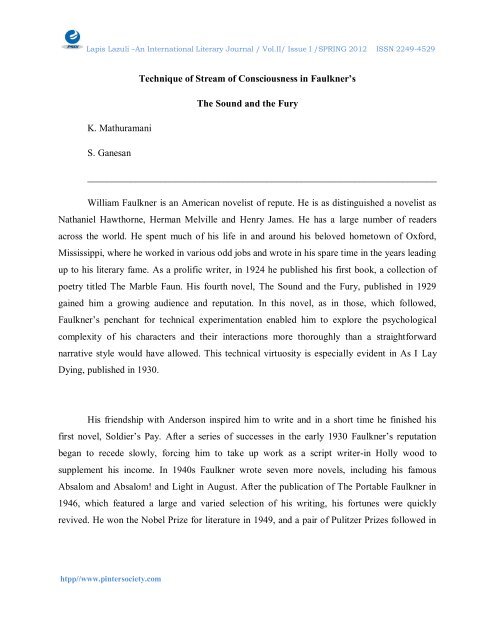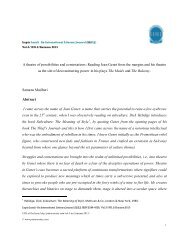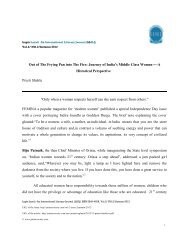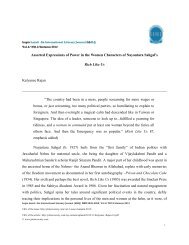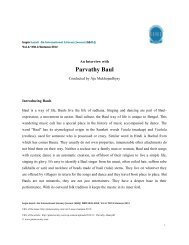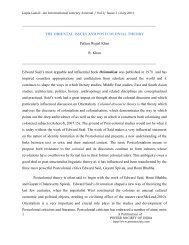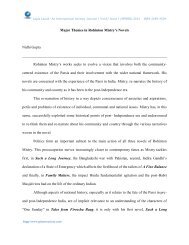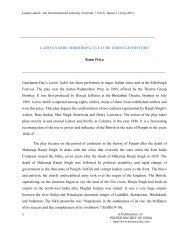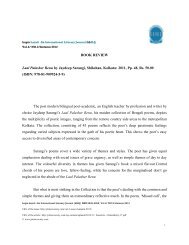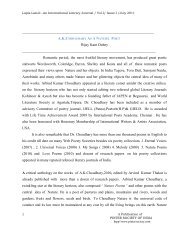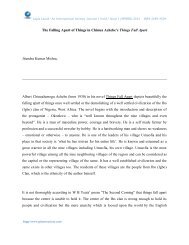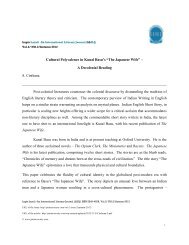Technique of Stream of Consciousness in Faulkner's The - lapis lazuli
Technique of Stream of Consciousness in Faulkner's The - lapis lazuli
Technique of Stream of Consciousness in Faulkner's The - lapis lazuli
You also want an ePaper? Increase the reach of your titles
YUMPU automatically turns print PDFs into web optimized ePapers that Google loves.
Lapis Lazuli –An International Literary Journal / Vol.II/ Issue I /SPRING 2012 ISSN 2249-4529<br />
K. Mathuramani<br />
S. Ganesan<br />
htpp//www.p<strong>in</strong>tersociety.com<br />
<strong>Technique</strong> <strong>of</strong> <strong>Stream</strong> <strong>of</strong> <strong>Consciousness</strong> <strong>in</strong> Faulkner’s<br />
<strong>The</strong> Sound and the Fury<br />
________________________________________________________________________<br />
William Faulkner is an American novelist <strong>of</strong> repute. He is as dist<strong>in</strong>guished a novelist as<br />
Nathaniel Hawthorne, Herman Melville and Henry James. He has a large number <strong>of</strong> readers<br />
across the world. He spent much <strong>of</strong> his life <strong>in</strong> and around his beloved hometown <strong>of</strong> Oxford,<br />
Mississippi, where he worked <strong>in</strong> various odd jobs and wrote <strong>in</strong> his spare time <strong>in</strong> the years lead<strong>in</strong>g<br />
up to his literary fame. As a prolific writer, <strong>in</strong> 1924 he published his first book, a collection <strong>of</strong><br />
poetry titled <strong>The</strong> Marble Faun. His fourth novel, <strong>The</strong> Sound and the Fury, published <strong>in</strong> 1929<br />
ga<strong>in</strong>ed him a grow<strong>in</strong>g audience and reputation. In this novel, as <strong>in</strong> those, which followed,<br />
Faulkner‟s penchant for technical experimentation enabled him to explore the psychological<br />
complexity <strong>of</strong> his characters and their <strong>in</strong>teractions more thoroughly than a straightforward<br />
narrative style would have allowed. This technical virtuosity is especially evident <strong>in</strong> As I Lay<br />
Dy<strong>in</strong>g, published <strong>in</strong> 1930.<br />
His friendship with Anderson <strong>in</strong>spired him to write and <strong>in</strong> a short time he f<strong>in</strong>ished his<br />
first novel, Soldier‟s Pay. After a series <strong>of</strong> successes <strong>in</strong> the early 1930 Faulkner‟s reputation<br />
began to recede slowly, forc<strong>in</strong>g him to take up work as a script writer-<strong>in</strong> Holly wood to<br />
supplement his <strong>in</strong>come. In 1940s Faulkner wrote seven more novels, <strong>in</strong>clud<strong>in</strong>g his famous<br />
Absalom and Absalom! and Light <strong>in</strong> August. After the publication <strong>of</strong> <strong>The</strong> Portable Faulkner <strong>in</strong><br />
1946, which featured a large and varied selection <strong>of</strong> his writ<strong>in</strong>g, his fortunes were quickly<br />
revived. He won the Nobel Prize for literature <strong>in</strong> 1949, and a pair <strong>of</strong> Pulitzer Prizes followed <strong>in</strong>
Lapis Lazuli –An International Literary Journal / Vol.II/ Issue I /SPRING 2012 ISSN 2249-4529<br />
the ensu<strong>in</strong>g decade. Faulkner cont<strong>in</strong>ued to give shape to his literary quest till his death, <strong>in</strong><br />
Byhalia, Mississippi on July 6, 1962 at the age <strong>of</strong> 64.<br />
.<br />
<strong>The</strong> <strong>Stream</strong> Of <strong>Consciousness</strong><br />
Narration <strong>of</strong> the events <strong>of</strong> a story through the „<strong>Stream</strong> –<strong>of</strong> – <strong>Consciousness</strong>‟ technique is<br />
the development and result <strong>of</strong> literary research <strong>in</strong> the twentieth century.<br />
„<strong>Stream</strong> <strong>of</strong> consciousness‟ is a technique whereby the author writes as though he is <strong>in</strong>side the<br />
m<strong>in</strong>d <strong>of</strong> character. This technique reflects the twentieth century‟s research and <strong>in</strong>terest <strong>in</strong> the<br />
psychology <strong>of</strong> “free association” As a technique, stream <strong>of</strong> consciousness was first used <strong>in</strong><br />
English by James Joyce and Virg<strong>in</strong>ia Wolf, But Faulkner‟s use <strong>of</strong> this technique <strong>in</strong> <strong>The</strong> Sound<br />
and the Fury is outstand<strong>in</strong>g.<br />
<strong>The</strong> first section <strong>in</strong> the novel namely „Benjy section‟ serves two purposes . It reveals<br />
Benjy‟s psyche or <strong>in</strong>ner life. It also provides an objective record <strong>of</strong> certa<strong>in</strong> dramatic events <strong>in</strong> the<br />
Compson family, more objective than Quent<strong>in</strong> and Jason‟s sections. Faulkner <strong>in</strong> fact makes him<br />
speak the way a thirty –three – year old idiot would, Faulkner gets <strong>in</strong>to his m<strong>in</strong>d, as it were and<br />
evolves a severely constra<strong>in</strong>ed style that harmonizes with Benjy‟s limited abilites. Benjy can<br />
experience only sensations. He is <strong>in</strong>cable <strong>of</strong> abstraction and generalization. His body is affected<br />
by some physical sensation and this activates his memory <strong>of</strong> a similar experience <strong>in</strong> the past.<br />
<strong>The</strong> best way to describe Benjy‟s reaction then would be to <strong>of</strong>fer a stream-<strong>of</strong>-<br />
consciousness render<strong>in</strong>g <strong>of</strong> a present action. Certa<strong>in</strong> th<strong>in</strong>gs make an impression on his m<strong>in</strong>d but<br />
htpp//www.p<strong>in</strong>tersociety.com
Lapis Lazuli –An International Literary Journal / Vol.II/ Issue I /SPRING 2012 ISSN 2249-4529<br />
he cannot correlate or connect th<strong>in</strong>gs, except through a basic sensuous impression. For example,<br />
when he hears the golfer‟s call for their „caddie‟ the name rem<strong>in</strong>ds him <strong>of</strong> his sister Caddy,<br />
whom he loves more than any other person.<br />
Luster leads Benjy through a fence and scolds him for gett<strong>in</strong>g snagged on a rail. Benjy‟s gett<strong>in</strong>g<br />
snagged on the rail rem<strong>in</strong>ds him <strong>of</strong> a similar episode <strong>in</strong> the past. His m<strong>in</strong>d then jumps back to<br />
1902 when Caddy was tak<strong>in</strong>g him on an errand and he had to stoop low to keep from gett<strong>in</strong>g<br />
snagged. Caddy‟s ask<strong>in</strong>g him on that occasion to keep his hands <strong>in</strong> his pockets <strong>in</strong> order to keep<br />
them warm comes flash<strong>in</strong>g <strong>in</strong> the m<strong>in</strong>d <strong>of</strong> Benjy. When Luster carries Benjy through the fence <strong>in</strong><br />
1928, Benjy‟s m<strong>in</strong>d automatically returns to an earlier scene, <strong>in</strong> which he was <strong>in</strong>volved <strong>in</strong> the<br />
same type <strong>of</strong> activity. Time has no mean<strong>in</strong>g for Benjy and the past and the present blend <strong>in</strong>to<br />
one response for him. Many <strong>of</strong> the scenes <strong>of</strong> the past that Benjy remembers are connected with<br />
his sister Caddy <strong>in</strong> one-way or another.<br />
Benjy reacts to sensual impressions, such as the cold <strong>of</strong> the gate or the rattl<strong>in</strong>g <strong>of</strong> leaves. <strong>The</strong><br />
thought <strong>of</strong> cold hands rem<strong>in</strong>ds Benjy <strong>of</strong> an earlier episode. Uncle Maury once visited the<br />
Compson family for the Christmas holidays. He saw that Benjy was a worry to Mrs. Compson.<br />
He asked her to let Versh take Benjy out doors. Versh dressed Benjy and told him to keep his<br />
hands <strong>in</strong> his pockets. Benjy immediately went to the gate to wait for Caddy. Benjy now<br />
remembers Caddy‟s smell<strong>in</strong>g like tress, “She smelled like tress” (<strong>The</strong> Sound and the Fury 31)<br />
This memory causes him to start moan<strong>in</strong>g and Luster gives him a Jimson weed to keep him quiet<br />
very <strong>of</strong>ten Benjy‟s mourn<strong>in</strong>g is the result <strong>of</strong> some memory <strong>of</strong> Caddy. His memory causes him to<br />
start mourn<strong>in</strong>g. Luster cannot understand why Benjy mourns so much. When Luster takes Benjy<br />
to a house – Benjy is rem<strong>in</strong>ded <strong>of</strong> an earlier event that occurred <strong>in</strong> that particular place. For<br />
example, the scenes that Benjy remembers about his name be<strong>in</strong>g changed from Maury to Benjy<br />
occur <strong>in</strong> the last part <strong>of</strong> the Benjy section, when Luster carries him <strong>in</strong>to the same house Versh<br />
said, “Your name is Benjam<strong>in</strong> now you know how come your name Benjam<strong>in</strong> now.” (<strong>The</strong><br />
Sound and the Fury 52)<br />
htpp//www.p<strong>in</strong>tersociety.com
Lapis Lazuli –An International Literary Journal / Vol.II/ Issue I /SPRING 2012 ISSN 2249-4529<br />
As Benjy plays <strong>in</strong> the water he remembers the time when he was three years old. Benjy,<br />
Caddy, Quent<strong>in</strong> and Jason were all play<strong>in</strong>g from the same branch. Caddy fell and got her drawers<br />
„muddy‟. She took <strong>of</strong>f the dress so as to let her underclothes dry. Quent<strong>in</strong> then scolded and<br />
slapped her and Caddy fell <strong>in</strong>to water aga<strong>in</strong>. When Benjy saw that Caddy was all wet and<br />
muddy, he began to cry and Caddy rushed to comfort him. <strong>The</strong>re is a symbolic purpose also for<br />
this particular scene. Caddy‟s fall<strong>in</strong>g down and gett<strong>in</strong>g up prepares the readers for her<br />
promiscuity later <strong>in</strong> the novel.<br />
On one such occasion some girls came by then and Benjy wanted to say someth<strong>in</strong>g to<br />
them about Caddy just to unburden his m<strong>in</strong>d <strong>of</strong> the thought <strong>of</strong> Caddy. But the girls were<br />
frightened and ran away. Benjy chased the girls try<strong>in</strong>g to speak to them. Jason and Mrs.<br />
Compson mistook the feel<strong>in</strong>gs <strong>of</strong> Benjy. Benjy is rem<strong>in</strong>ded <strong>of</strong> these events now and starts<br />
moan<strong>in</strong>g. Luster gets angry, when Benjy does not stop cry<strong>in</strong>g. Dilsey comes out <strong>of</strong> the house at<br />
this time, scolds Luster and takes Benjy to the kitchen.<br />
Benjy‟s m<strong>in</strong>d suddenly jumps to the picture <strong>of</strong> Jason‟s cutt<strong>in</strong>g up <strong>of</strong> his dolls.<br />
“He cut up all the dolls, Man Beny and I made‟ Caddy said, „He did it Just for meanness” (<strong>The</strong><br />
Sound and the Fury 49)<br />
Suddenly, he is rem<strong>in</strong>ded <strong>of</strong> the old occurrence <strong>of</strong> Jason‟s burn<strong>in</strong>g the two free passes,<br />
without giv<strong>in</strong>g them to Luster. When Luster starts gett<strong>in</strong>g Benjy ready for bed, Benjy remembers<br />
the night <strong>of</strong> Dam Uddy‟s death and Dilsey‟s tak<strong>in</strong>g him to a room, which is not their usual<br />
sleep<strong>in</strong>g room.<br />
htpp//www.p<strong>in</strong>tersociety.com
Lapis Lazuli –An International Literary Journal / Vol.II/ Issue I /SPRING 2012 ISSN 2249-4529<br />
In “Quent<strong>in</strong> Section” <strong>of</strong> the novel, the entire section is told from with<strong>in</strong> Quent<strong>in</strong>‟s m<strong>in</strong>d,<br />
on the day when he commits suicide. As with Benjy, Quent<strong>in</strong> is at Harvard. He is roam<strong>in</strong>g<br />
around Boston and Harvard. But his m<strong>in</strong>d is more complex than Benjy‟s. Where as “ Benjy<br />
section” only records sensuous impressions that have symbolic significance, Quent<strong>in</strong>‟s section<br />
plunges <strong>in</strong>to the depths <strong>of</strong> the causes and effects <strong>of</strong> certa<strong>in</strong> actions. Throughout the section,<br />
Quent<strong>in</strong>‟s chief concern is about Caddy‟s s<strong>in</strong>s and her loss <strong>of</strong> virg<strong>in</strong>ity.<br />
<strong>The</strong> section opens with Quent<strong>in</strong> notic<strong>in</strong>g the shadow <strong>of</strong> the past and his remember<strong>in</strong>g the<br />
watch his father gave him and the advice Mr. Compson <strong>of</strong>fered about the need to forget time.<br />
Mr. Compson is <strong>of</strong> the conviction that there are no values worth anyth<strong>in</strong>g <strong>in</strong> life and that time<br />
cures all th<strong>in</strong>gs. This is the philosophy that Quent<strong>in</strong> strives to deny, but he is unable to do so.<br />
Quent<strong>in</strong>‟s concern with time and with her father‟s cynical view <strong>of</strong> life is the prime motive <strong>of</strong> this<br />
section.<br />
Shreve comes <strong>in</strong> and asks Quent<strong>in</strong> about his classes. Quent<strong>in</strong> tells Shreve that he will come later.<br />
<strong>The</strong> word „later‟ br<strong>in</strong>gs to his m<strong>in</strong>d the views <strong>of</strong> his father on time. <strong>The</strong> thought <strong>of</strong> his father<br />
rem<strong>in</strong>ds him <strong>of</strong> his father‟s say<strong>in</strong>g that, “Virg<strong>in</strong>ity was only important to men, not women” (<strong>The</strong><br />
Sound and the Fury 60)<br />
When he ( the father) hears <strong>of</strong> the illegal pregnancy <strong>of</strong> Caddy, he is not upset at all. He tries to<br />
make Quent<strong>in</strong> understand that it was the man who <strong>in</strong>vented virg<strong>in</strong>ity and that women don‟t care<br />
about it.<br />
This statement hurts Quent<strong>in</strong>, because he is still pure. Mr. Compson is <strong>of</strong> the view that <strong>in</strong> course<br />
<strong>of</strong> time he will not even remember any event, which seems to be dreadful now. “ <strong>The</strong>y cannot<br />
even remember tomorrow what seemed dreadful today” (<strong>The</strong> Sound and the Fury 61)<br />
htpp//www.p<strong>in</strong>tersociety.com
Lapis Lazuli –An International Literary Journal / Vol.II/ Issue I /SPRING 2012 ISSN 2249-4529<br />
Quent<strong>in</strong> beg<strong>in</strong>s to contemplate suicide so that he will not have to forget the horror he now feels.<br />
He picks up his watch and twists the hands <strong>of</strong> the watch. Quent<strong>in</strong> symbolically tries to stop time<br />
before time allows him to forget his bereavement.<br />
If Mr.Compson is right and all human experience is absurd, then the grief that Quent<strong>in</strong> feels over<br />
Caddy‟s s<strong>in</strong>s is also absurd. <strong>The</strong>n all <strong>of</strong> Quent<strong>in</strong>‟s values are mean<strong>in</strong>gless. But Quent<strong>in</strong> cannot<br />
live without some values; therefore suicide is his only way to escape from the absurdity <strong>of</strong> life.<br />
When Quent<strong>in</strong> sits beside a Negro <strong>in</strong> the streetcar, he remembers Dilsey, the Negro_cook <strong>of</strong> his<br />
house. He th<strong>in</strong>ks <strong>of</strong> the difference between the northern and southern Negroes. <strong>The</strong> thought <strong>of</strong><br />
„home‟ recalls to his m<strong>in</strong>d the say<strong>in</strong>g <strong>of</strong> his mother that Jason is the only one who looks after her<br />
side <strong>of</strong> the family.<br />
“<strong>The</strong> others they are not my flesh and blood like he is, strangers noth<strong>in</strong>g <strong>of</strong> m<strong>in</strong>e and I am afraid<br />
<strong>of</strong> them, I can take Jason and go where we are not known” (<strong>The</strong> Sound and the Fury 79)<br />
Quent<strong>in</strong>‟s thoughts revert aga<strong>in</strong> and aga<strong>in</strong> to „Caddy‟. His meet<strong>in</strong>g with the Italian girl rem<strong>in</strong>ds<br />
him <strong>of</strong> the girl named „Natalie‟ whom Caddy branded as a dirty little girl. Quent<strong>in</strong> is rem<strong>in</strong>ded <strong>of</strong><br />
the day when he told Caddy that he would take care <strong>of</strong> her and Caddy‟s response. “I don‟t give a<br />
Goddam what you do” (<strong>The</strong> Sound and the Fury 106)<br />
Caddy‟s motivation beh<strong>in</strong>d her promiscuity is her <strong>in</strong>ner urge to reject all that Comp sons stand<br />
for. But Quent<strong>in</strong> is surely vexed over the promiscuity <strong>of</strong> Caddy. When his attempts to punish the<br />
seducers <strong>of</strong> Caddy fail, he is depressed over his <strong>in</strong>effectual actions. He decides to commit suicide<br />
to atone for Caddy‟s s<strong>in</strong>s.<br />
As we approach the end <strong>of</strong> Quent<strong>in</strong>‟s section, his memories become more devastat<strong>in</strong>g and<br />
horrible. Thoughts <strong>of</strong> the neurotic mother, the bellow<strong>in</strong>g Idiot Benjy, the cynical father<br />
htpp//www.p<strong>in</strong>tersociety.com
Lapis Lazuli –An International Literary Journal / Vol.II/ Issue I /SPRING 2012 ISSN 2249-4529<br />
(Compson) and the s<strong>in</strong>ful sister (Caddy) comb<strong>in</strong>ed with his (Quent<strong>in</strong>‟s) futile and <strong>in</strong>effective<br />
attempts to restore order, force Quent<strong>in</strong> to at the decision that “suicide is the only way to get rid<br />
<strong>of</strong> his mental tension”.<br />
<strong>The</strong> third section is a narrative by the youngest <strong>of</strong> the Compson brothers. <strong>The</strong> section namely<br />
Jason‟s section, takes place on a good Friday. Jason is approximately 35 years then. His brothers<br />
and Caddy do not trust Jason. He is always alone and he delights <strong>in</strong> do<strong>in</strong>g mean th<strong>in</strong>gs and <strong>in</strong><br />
torment<strong>in</strong>g other people. Jason takes a perverse delight <strong>in</strong> annoy<strong>in</strong>g them. Unlike Benjy and<br />
Quent<strong>in</strong>, Jason never gives the past a thought and feels no allegiance to his ancestors as does<br />
Quent<strong>in</strong>. <strong>The</strong> Jason section therefore moves on swiftly. Whereas Quent<strong>in</strong>‟s m<strong>in</strong>d is complicated<br />
and terribly <strong>in</strong>volved <strong>in</strong> the <strong>in</strong>tricacies <strong>of</strong> life, the Jason section is simple. Rem<strong>in</strong>iscences and old<br />
memories are the essence <strong>of</strong> the Benjy and Quent<strong>in</strong>‟s sections, whereas mov<strong>in</strong>g actions like the<br />
fast carriage, the chase, and rush<strong>in</strong>g with the false cheque leaf are the motifs <strong>of</strong> this section.<br />
<strong>The</strong> f<strong>in</strong>al section narrated by the author is the shortest <strong>of</strong> the four sections. <strong>The</strong> dom<strong>in</strong>ant figure<br />
<strong>in</strong> this section is „Dilsey‟. Amidst the Sound and the Fury <strong>of</strong> the Compson‟s, Dilsey is the only<br />
calm and unruffled soul endeavor<strong>in</strong>g to br<strong>in</strong>g peace and order. Dilsey‟s faith <strong>in</strong> God, the care<br />
with which she handles Benjy despite his idiocy and desertation by the other members <strong>of</strong> the<br />
family, her appreciation <strong>of</strong> the sermon about the equaliz<strong>in</strong>g force <strong>of</strong> death and about the<br />
beg<strong>in</strong>n<strong>in</strong>g and end <strong>of</strong> th<strong>in</strong>gs from the essence <strong>of</strong> this section. <strong>The</strong> only<br />
„<strong>Stream</strong>_<strong>of</strong>_<strong>Consciousness</strong>‟ evident <strong>in</strong> this section is the memory <strong>of</strong> Dilsey about the story <strong>of</strong> the<br />
Compson family, the days <strong>of</strong> the prosperity as well as the adversity and <strong>in</strong> short the beg<strong>in</strong>n<strong>in</strong>g<br />
and end <strong>of</strong> the family.<br />
htpp//www.p<strong>in</strong>tersociety.com
Lapis Lazuli –An International Literary Journal / Vol.II/ Issue I /SPRING 2012 ISSN 2249-4529<br />
<strong>The</strong> first three parts are <strong>in</strong> the steam-<strong>of</strong>-consciousness mode.In the last section, the author<br />
replaces even the method <strong>of</strong> narration, <strong>The</strong> stream <strong>of</strong> consciousness is replaced by the straight<br />
forward narrative <strong>of</strong> the author.<br />
Conclusion<br />
While us<strong>in</strong>g the technique <strong>of</strong> the <strong>Stream</strong>-<strong>of</strong>-<strong>Consciousness</strong>, Faulkner adopts the style suitable to<br />
each section.<strong>The</strong>re are no difficult words <strong>in</strong> first section,because the vocabulary <strong>of</strong> an idiot<br />
(Benjy) would naturally be simple. It becomes complex <strong>in</strong> the second section where the <strong>in</strong>tricate<br />
m<strong>in</strong>d <strong>of</strong> Quent<strong>in</strong> is presented.Benjy is <strong>in</strong>terested only <strong>in</strong> images and impressions whereas<br />
Quent<strong>in</strong> is <strong>in</strong>terested <strong>in</strong> complex and difficult ideas. Quent<strong>in</strong> is try<strong>in</strong>g to solve complicated moral<br />
issues; therefore his section is more complicated. <strong>The</strong> style changes drastically <strong>in</strong> Jason‟s<br />
section. Jason‟s m<strong>in</strong>d is <strong>in</strong>volved, but it is the m<strong>in</strong>d <strong>of</strong> a monomaniac. He is concerned only with<br />
earn<strong>in</strong>g money and teas<strong>in</strong>g others. This section flows at a rapid place because Jason is not<br />
troubled with the <strong>in</strong>tricacies <strong>of</strong> life. He is not concerned with images or impressions. <strong>The</strong> order<br />
and simplicity <strong>of</strong> this section is a result <strong>of</strong> his s<strong>in</strong>gle-m<strong>in</strong>ded viciousness. <strong>The</strong> f<strong>in</strong>al section is a<br />
straightforward narrative. Faulkner adjusts his style <strong>in</strong> this section to fit the character <strong>of</strong> Dilsey.<br />
Thus we see a quiet dignified style <strong>in</strong> this section.<br />
<strong>The</strong> states <strong>of</strong> consciousness <strong>of</strong> the three brothers <strong>in</strong>terpret the events <strong>in</strong> the Compson household<br />
by three different modes. <strong>The</strong> first three sections prepare for an action that will discharge itself<br />
only <strong>in</strong> the last section <strong>of</strong> the novel.Though the pioneer<strong>in</strong>g honour <strong>of</strong> us<strong>in</strong>g this technique goes to<br />
James Joyce and Virg<strong>in</strong>ia Wolf, it may be stated with assertion that the technique reaches<br />
perfection at the hands <strong>of</strong> Faulkner. Often novels <strong>of</strong> this technique are unexcit<strong>in</strong>g and tax<strong>in</strong>g.<br />
Faulkner, however imparts dramatic vividness and variety to this story, utiliz<strong>in</strong>g his and<br />
imag<strong>in</strong>ative powers. <strong>The</strong> reader‟s m<strong>in</strong>ds f<strong>in</strong>d a very wholesome and stimulat<strong>in</strong>g exercise <strong>in</strong><br />
pierc<strong>in</strong>g through the scattered fragments and form<strong>in</strong>g a whole. It is soon discovered that unlike<br />
novels with a predom<strong>in</strong>antly psychological orientation, Faulkner‟s novel has dist<strong>in</strong>ct movement<br />
and action.<br />
htpp//www.p<strong>in</strong>tersociety.com
Lapis Lazuli –An International Literary Journal / Vol.II/ Issue I /SPRING 2012 ISSN 2249-4529<br />
<strong>The</strong> chief <strong>in</strong>terest <strong>of</strong> the novelist is to reveal the essential self or personality <strong>of</strong> each narrator<br />
through the use <strong>of</strong> <strong>in</strong>terior monologue. Faulkner takes us as close to the heart and m<strong>in</strong>d <strong>of</strong> the<br />
narrator as is with<strong>in</strong> the power and range <strong>of</strong> language. Not only this, the novel br<strong>in</strong>gs <strong>in</strong> value<br />
Judgment by just juxtapos<strong>in</strong>g the past and the present <strong>of</strong> the Compson family.<br />
To put it succ<strong>in</strong>ctly the success <strong>of</strong> the novel is due to the deft handl<strong>in</strong>g <strong>of</strong> the technique <strong>of</strong><br />
„<strong>Stream</strong>-<strong>of</strong>-consciousness‟ Faulkner, richly deserves. “<strong>The</strong> Nobel Prize”, that was awarded to<br />
him. Faulkner will be remembered by posterity for this masterpiece alone.<br />
htpp//www.p<strong>in</strong>tersociety.com<br />
Reference:<br />
1. Faulkner, William. <strong>The</strong> Sound And the Fury, American Literature Texts Delhi : Oxford<br />
University Press 1981. Pr<strong>in</strong>t.<br />
2. Bassett, John. <strong>The</strong> Critical Heritage Michigan: Wayne state University Press, 1972. Pr<strong>in</strong>t.<br />
3. Beck, Warren. Faulkner‟s Po<strong>in</strong>t <strong>of</strong> View Madison: University <strong>of</strong> Wiscons<strong>in</strong> Press, 1976.<br />
Pr<strong>in</strong>t.<br />
4. Volpe, Edmond, L. A Reader’s Guide to William Faulkner London : Lowe & Byrone<br />
Pr<strong>in</strong>ters Ltd., 1964. Pr<strong>in</strong>t.<br />
______________________________________________________________________________<br />
About the Author:<br />
K. Mathuramani ,Asst. Pr<strong>of</strong> & Research Scholar, Dr. S. Ganesan ,Pr<strong>of</strong> & Head<br />
Department <strong>of</strong> English,Vel tech Dr. RR & Dr. SR Technical University,Avadi, Chennai-<br />
62
Lapis Lazuli –An International Literary Journal / Vol.II/ Issue I /SPRING 2012 ISSN 2249-4529<br />
htpp//www.p<strong>in</strong>tersociety.com


